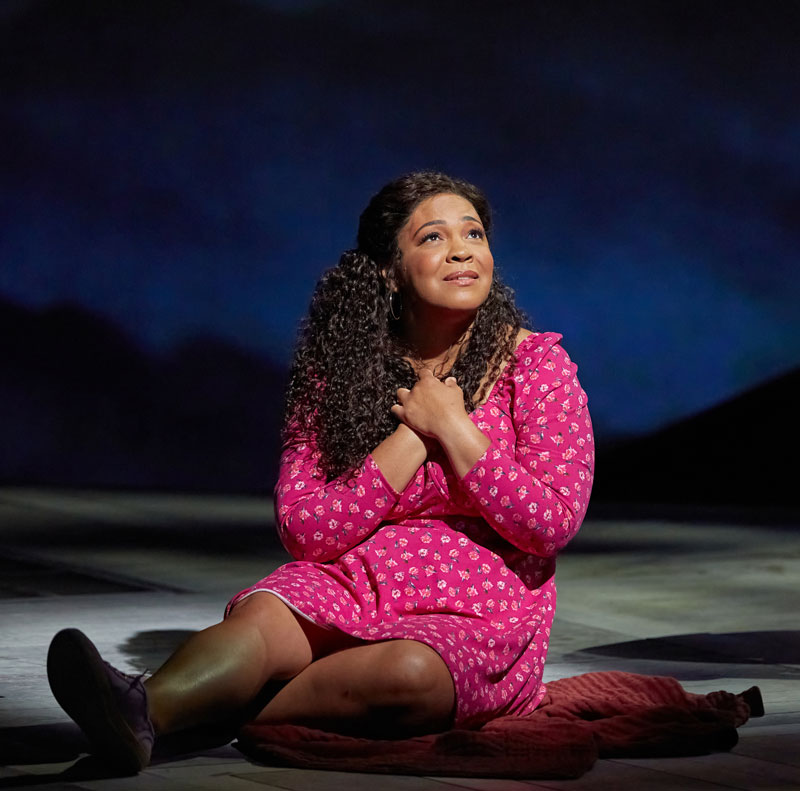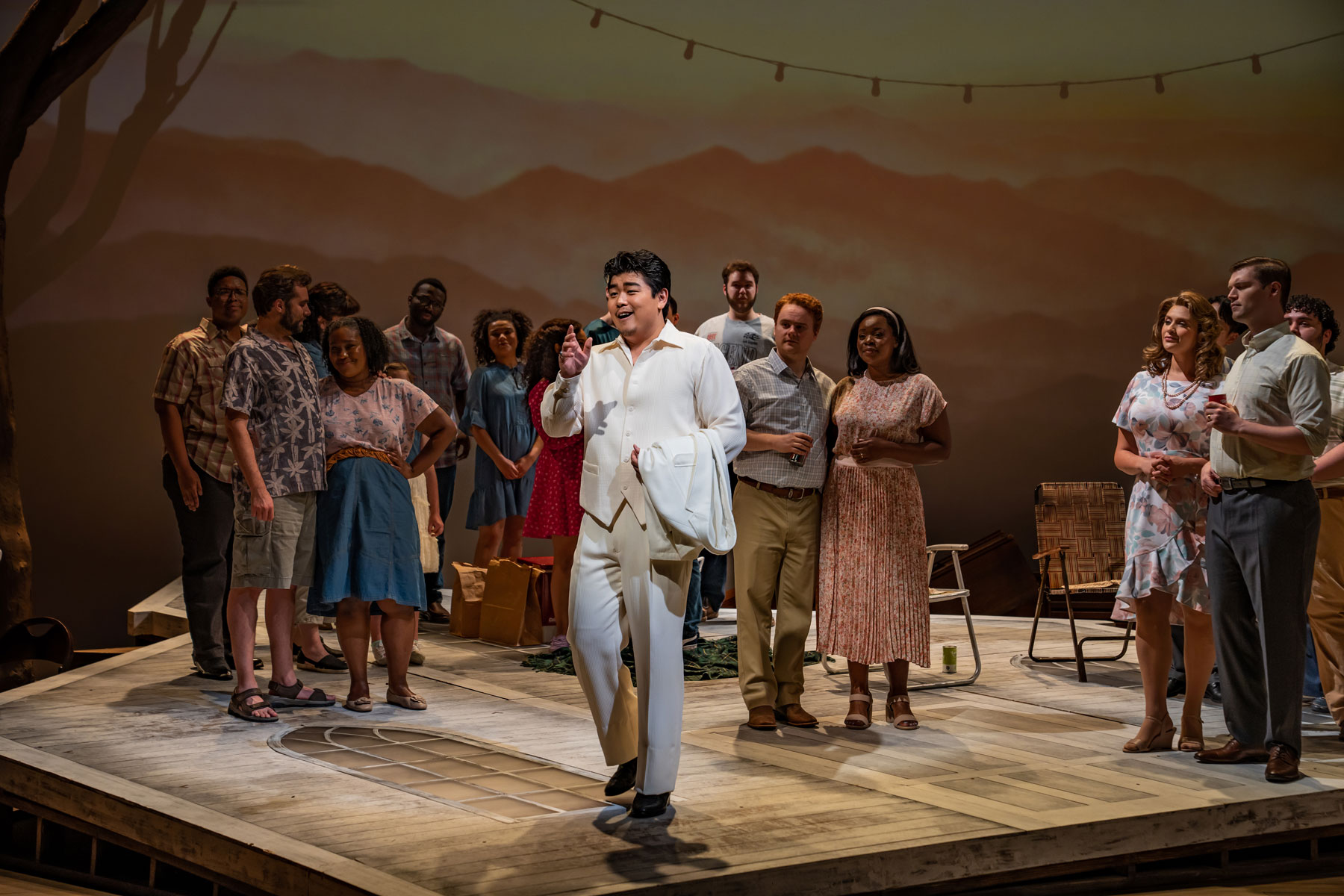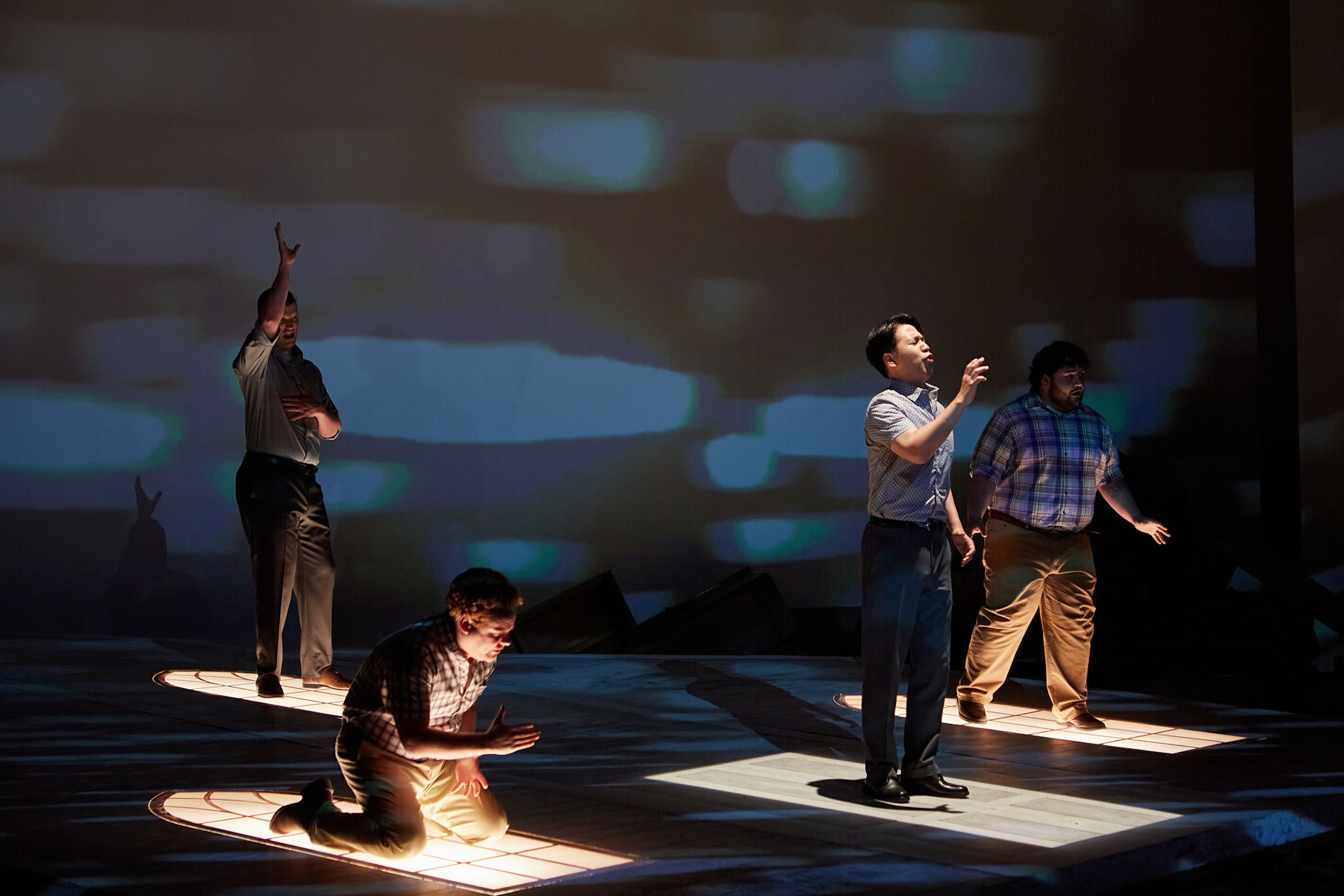From the downbeat of Opera Theatre of Saint Louis’ riveting production of Carlisle Floyd’s Susannah, there was a palpable electricity in the air.
In fact, even before the first note occurred, Conductor Gemma New was rapturously welcomed to the podium with an ovation from her public. Anticipation was high, and she did not disappoint, eliciting an impassioned, richly detailed reading, that was nonetheless marked by a playful and balanced lightness, as well as a haunting melancholy when called for.
Maestra New was in consummate command throughout, proving especially adept at inexorably building to almost unbearable tension, and then delivering a passionate release of sound that was irresistibly goose-bump inducing. I have heard the Saint Louis Symphony play beautifully in the OTSL pit on many occasions, but never have they played better than on this occasion. Moreover, New partnered seamlessly with a vocally resplendent cast.

Janai Brugger did not so much perform the role of Susannah as inhabit it. There seemed to be nothing in this challenging role that was not perfectly informed by her nuanced dramatization. Ms. Brugger is possessed of a substantial, silvery, shimmering soprano that she deployed effortlessly in the shifting moods of the musical demands. She could float the tone sweetly on the breath one minute and fill the house with fiery top notes the next.
Her first scenes as a joyful (enough) teenager marked by buoyant vocalization, were capped by a radiant rendition of Ain’t It a Pretty Night. She colored her singing with just the right incredulous and tremulous tone as she responded to her unjust shunning. She found just the right firmness of utterance in her reproval of Little Bat, and her denunciation of him was steely and chilling.
Her haunted, limpidly voiced defeat and submission to Reverend Blitch’s manipulation, was an effect that found further superb application in a spell-binding traversal of The Trees on the Mountain, which held the audience transfixed. In the final pages, she unleashed unending torrents of controlled sound in her defiant confrontation with hypocrisy. Janai’s fervid, alluring singing was perfectly wedded to her physique du role. Her fetching appearance made it totally believable that the menfolk were more appreciative of Susannah than the womenfolk would like.
By any measure, Janai Brugger provided a true star turn for this acclaimed festival and seems destined to become the Susannah of choice for companies throughout the industry. She was matched in her success by the towering performance from William Guanbo Su as Olin Blitch.

In my recent experience, the venerable Samuel Ramey all but owned this role, and now, well, son of a Blitch, but Su may just be the heir apparent. He certainly has all the goods, with his imposing stature, distinctively handsome looks, charismatic appeal, and of course, that voice. He regales us with a vibrant, orotund bass instrument of uncommon distinction. His steady delivery is marked by a slightly throbbing vibrato that is very engaging.
Mr. Su does not just score in Blitch’s over the top “public” moments, but really comes into his own with his subtly managed, insinuating seduction of Susannah, masterful in its self-pitying, dripping insincerity that disorients the girl. His subsequent remorse as he finds a moral compass he had long buried was one of the most powerful and moving scenes in an evening that was chock full of them. It will be a pleasure to watch this young talent as his star continues to surely rise.
Frederick Ballantine was an unusually fine Sam Polk, his shining tenor imbuing the character with a sheen and refinement that played against the stereotypical wastrel, to include his swaggering masculine appeal. Mr. Ballantine’s charming and protective relationship with his sister was winningly and convincingly conveyed.

Christian Sanders’ take-no-prisoners, raw approach to presenting a coiled spring Little Bat McLean was very effective. A bundle of neuroses, repressed feelings, and ultimately, guilt, Mr. Sanders used his secure, slightly wiry tenor to fearless effect. When Susannah seems to forgive him and sweetly coaxes him to her side only to bluntly slap him to the ground, he was like a pitiable wounded puppy.
The smaller roles were uniformly successful, and all soloists brought well-schooled voices, and well-informed characterizations to the mix. Melissa Joseph showed off a robust soprano as Mrs. Gleaton; Rachel Barg’s plummy mezzo served well as Mrs. Ott; and Mrs. Hayes benefitted from Anastasia Malliaras’ poised soprano. Among the Elders, César Andrés Parreño gifted Elder Hayes with a ringing, focused tenor; Joseph Park’s youthful bass-baritone shone as Elder Ott; and River Guard’s distinctive tenor was well suited to Elder Gleaton.
Little Bat’s controlling, bullying parents were memorably taken by Keith Klein (Elder McClean), a lanky, authoritative presence with a rolling bass-baritone; and Melissa Pfaender (Mrs. McClean), a glamorous candidate for The Real Housewives of New Hope Valley, who also happens to have a warm, beguiling mezzo-soprano. Most memorable single line delivery of the night was at the end of the church supper scene rejecting Susannah, when Ms. Pfaender maliciously and deliberately intoned/droned: “ I wouldn’t tech them peas o’ her’n.” The audience went wild.
Final casting mention must be to praise the exquisite contribution by the all-important chorus,
which was meticulously tutored by Chorus Master Andrew Whitfield. The balance, blend, phrasing and diction were unsurpassably stirring.
In recent years, whenever I have experienced a production design that I found among the best I have ever seen, the ubiquitous video projection designer Greg Emetaz seems to be central to the project. Mr. Emetaz never fails to deliver, and on this occasion, he has been ably abetted and complemented by set designer Andrew Boyce and lighting designer Eric Southern.
Mr. Boyce has quite brilliantly placed a raked church façade at the center of the stage, which is the main playing platform. Other simple but highly effective touches are a walled enclosure that has a door to Sam’s cabin stage right, a lofty church window stage left that looks down on an abstract pile of pews, and a barren tree up right. The concept of the pious hypocrites tromping around on top of the very church in which they worship spoke volumes.
Mr. Southern has conspired with the projected imagery to contrive a near miracle of a lighting design. The ability to light the “windows” of the church façade floor from below was just one of a continually morphing display of near cinematic effects. The gobo projection that framed Blitch in a white cross for his “agony in the garden-” like solo moment, was a staggering dramatic effect.
Given that the opera was updated to the 1990’s, Kaye Voyce responded with a wide-ranging costume design that successfully defined the characters and helped establish societal relationships. Olin Blitch shows up at the revival in a remarkable , eye-popping shiny blue suit that is far more Elvis than it is Elmer Gantry. I felt that the updating, while consistently followed, was the one element of the production I would have preferred otherwise.
Updating it far later than its intended period, means that World War II has ended; television has replaced radio; rock and roll has flourished; black, gay, and women’s rights movements have happened; and communication has put people in easy correspondence. It is difficult to resonate with me that these people of the 90’s would not have been changed by the country’s evolution, or at least readily aware of it. And the square dancing that is dictated by the score has been innovatively replaced by two-steps and line dancing, cleanly staged by Seán Curran. Not quite the same, naïve visual I would prefer.
That said, I cannot imagine this nonetheless supremely affecting production could have been achieved without the masterful direction by Patricia Racette. Herself a notable and heralded proponent of the title role, Ms. Racette has not missed a trick, and has staged emotionally honest interactions for every dramatic situation. She has not only moved the large cast around with clarity, variety, and purpose, but really excels in the work’s private moments. I am sure that Ms. Brugger’s supreme vocal and dramatic achievement in her two arias was shaped in earnest collaboration with Ms. Racette.
It is a crowning achievement for Opera Theatre of Saint Louis to have mounted this remarkable evening in the theatre, led by three women at the top of their game: Gemma New, Patricia Racette, and Janai Brugger.
Oh, Susannah, indeed!
James Sohre
Susannah
Music and Libretto by Carlisle Floyd
Mrs. Gleaton: Melissa Joseph; Mrs. Ott: Rachel Barg; Mrs. Hayes: Anastasia Malliaras; Mrs. McClean: Melissa Pfaender; Elder McLean: Keith Klein; Olin Blitch: William Guanbo Su; Elder Hayes: César Andrés Parreño; Elder Ott: Joseph Park; Elder Gleaton: River Guard; Susannah Polk: Janai Brugger; Little Bat McLean: Christian Sanders; Sam Polk: Frederick Ballantine; First Man: Kellen Schrimper; Second Man: Casey Germain; Conductor: Gemma New; Director: Patricia Racette; Set Designer: Andrew Boyce; Costume Designer: Kaye Voyce; Video Projection Desginer: Greg Emetaz; Lighting Designer: Eric Southern; Wig and Make-up Designers: Krystal Balleza and Will Vicari; Choreography: Seán Curran; Chorus Master: Andrew Whitfield
Top image: Janai Brugger as Susannah and cast. Photo © Eric Woolsey.